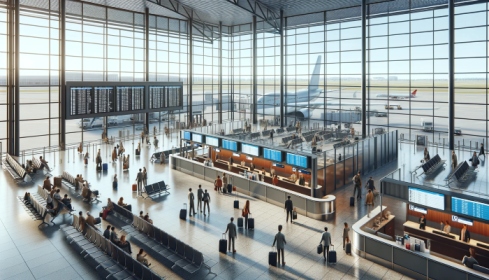Monday, September 9, 2024 Air Canada is preparing for a significant disruption of its operations as it braces for a possible pilot strike later this month. The airline’s management has started making contingency plans, anticipating a near-total shutdown of its services if negotiations with the Air Line Pilots Association (ALPA), which represents more than 5,000 of its pilots, fail to produce an agreement soon. The dispute stems from stalled pay talks between Air Canada and its pilots, who are demanding substantial pay increases to bring their compensation in line with counterparts at major US airlines.
ALPA, which represents Air Canada’s pilots, has threatened to call for a 72-hour strike notice or initiate a lockout if an agreement is not reached imminently. With tensions rising, Air Canada has announced plans to gradually suspend flights over three days in preparation for a full-scale strike or lockout. Air Canada’s Chief Executive Officer, Michael Rousseau, expressed optimism that an agreement could still be reached, but the airline remains on high alert.

“Air Canada believes there is still time to reach an agreement with our pilot group, provided ALPA moderates its wage demands, which far exceed average Canadian wage increases,” Rousseau said in a statement. However, if no agreement is reached soon, the airline may have no choice but to execute its shutdown plans. The core issue in the dispute revolves around wages.
Air Canada’s pilots have made it clear that they want a substantial pay increase to bring their salaries in line with pilots at major US airlines like Delta Air Lines. According to ALPA, the wage gap between Air Canada’s pilots and their American counterparts is stark, with some Delta pilots earning as much as 45% more than those at Air Canada based on hourly pay rates. “We’re flying the same passengers in the same airspace on some of the very same routes, and those pilots are being compensated dramatically more than us,” said Charlene Hudy, head of the union’s Air Canada chapter.
Hudy’s statement underscores the frustration felt by Air Canada’s pilots, who argue that they deserve compensation that reflects the global nature of the aviation industry and the similar conditions in which they operate alongside US carriers. In a vote held last month, Air Canada pilots voted unanimously in favor of industrial action, signaling their willingness to strike if their demands are not met. The union’s mandate for action has placed increased pressure on the airline, which has been attempting to balance the financial strain caused by the COVID-19 pandemic with the need to address the concerns of its workforce.
As negotiations remain at an impasse, Air Canada and its low-cost subsidiary, Air Canada Rouge, have developed a contingency plan that would see the gradual suspension of flights over a three-day period, beginning next week. The airline has indicated that unless a breakthrough is achieved, the planned shutdown would result in the near-total suspension of operations. The union could call for a 72-hour strike notice or issue a lockout notice if a resolution is not reached soon.
Air Canada’s contingency plans are designed to minimize chaos and confusion for passengers. By gradually scaling back operations, the airline hopes to give passengers adequate notice to make alternative travel arrangements. However, if the airline shuts down all operations, it estimates that it would take about a week to fully resume services once an agreement is reached.
This potential disruption is likely to affect thousands of travelers, as Air Canada is one of the country’s largest airlines, with extensive domestic and international routes. The prospect of a strike at Air Canada has sparked concerns about the wider impact on air travel in Canada and North America. Air Canada plays a crucial role in connecting Canadian cities with international destinations, and a strike would lead to widespread cancellations, delays, and potential disruptions to travel plans for both leisure and business travelers.
Additionally, the standoff between Air Canada and its pilots comes at a time when the global airline industry is facing intense competition and challenges. Many major carriers, including those in the US, have increased pay for their pilots to retain talent and maintain smooth operations, especially in the wake of the COVID-19 pandemic, which saw significant workforce reductions. The ability to attract and retain skilled pilots has become a key factor in maintaining an airline’s competitive edge, and Air Canada’s pilots are keenly aware of the opportunities available to their counterparts south of the border.
The wage gap between US and Canadian pilots is not unique to Air Canada. Several airlines in Canada are grappling with similar demands as pilots seek pay increases in an industry where global mobility allows them to easily switch between employers across borders. If Air Canada fails to reach an agreement with ALPA, it could face challenges in retaining its workforce as pilots consider options at higher-paying airlines, particularly in the United States.
The negotiations between Air Canada and ALPA have become increasingly tense, with both sides standing firm on their positions. The airline has made it clear that it believes the union’s wage demands are excessive, arguing that they surpass average wage increases in Canada. Rousseau’s statement emphasizes the company’s view that while an agreement is possible, it will require ALPA to moderate its expectations.
On the other hand, ALPA has pointed to the growing disparity in compensation between Air Canada pilots and their counterparts at US airlines. Delta Air Lines, for instance, negotiated a new contract with its pilots in early 2023, which included pay increases of up to 34% over four years. This deal has become a benchmark for pilots across North America, including those at Air Canada, who believe that their compensation should reflect the value they bring to the airline and the industry.
Hudy, representing the pilots’ union, has been vocal about the need for a fair deal that ensures pilots are compensated adequately for their work, particularly given the unique challenges of the aviation industry. She has expressed frustration with the slow pace of negotiations and warned that without significant movement from Air Canada, industrial action will likely proceed. With negotiations at a critical juncture, both Air Canada and ALPA are facing pressure to find a solution that prevents a full-scale shutdown of the airline.
If the union proceeds with a strike or lockout notice, it would mark the first significant disruption of Air Canada’s operations since the COVID-19 pandemic, which grounded much of the global aviation industry. The outcome of the negotiations will have far-reaching implications not only for Air Canada’s pilots but also for the wider airline industry in Canada. If Air Canada agrees to the union’s demands, it could set a precedent for other Canadian carriers, leading to a ripple effect of wage increases across the sector.
Conversely, if the airline holds firm and no agreement is reached, the resulting strike could damage Air Canada’s reputation and operational reliability. As Air Canada braces for the possibility of a strike, passengers, employees, and industry observers will be watching closely to see how the dispute unfolds. One thing is clear: the outcome of these negotiations will have a lasting impact on the future of the airline and its workforce.
.



















